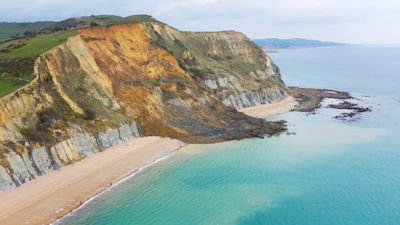COP26: Jurassic Coast's cliffs crumble into sea as coastal homes are claimed by erosion and floods

Video report by ITV News Meridian's Richard Slee
The rise in the Earth's temperature has led to extreme weather across the South East, from cliff falls in Dover, to flooding in Oxfordshire and record summer temperatures.
Nowhere offers a more obvious example of climate change in action than along the Jurassic coastline in Dorset, where this year, there was the biggest rock fall for more than 60 years.
All along the south coast there are places where the cliffs are crumbling as they are battered by the waves during stormy weather.
But many tourists still put themselves in harms way by walking close to the cliff edge at place like Beachy Head in East Sussex.
Experts worry that the warnings about climate change are still not being heard.
At the Oceanography Centre in Southampton, research shows that climate change is accelerating and there are clear examples in the South East, including a rapid warming of the sea around our coastline.
Dr Simon Boxall, National Oceanography Centre, University of Southampton said: "That increase of ocean temperatures means that we are getting more energy into the atmosphere and that means we're getting more storms, we're heating up the whole system.
"For storms to occur, for these winds and things, we need warm seas and that is why we are seeing such a change in our storm patterns."
Coastal erosion is also having an impact on an increasing number of people's lives, such as on the Isle of Sheppey where the creeping cliff edge is claiming more homes every year.
Another example is where a former lighthouse had to be moved back from the cliff edge at Beachy Head.
However, not everyone can afford such drastic action, like the people whose homes were damaged in Selsey 10 years ago.
The COP27 climate conference - what you need to know
What is COP27? When and where will it be?
What is COP27? When and where will it be?
Each year, the United Nations Framework Convention on Climate Change (UNFCCC) meets at what is called the Conference of the Parties (abbreviated as COP) to discuss the world's progress on climate change and how to tackle it.
COP27 is the 27th United Nations Climate Change Conference of the Parties summit which will be held in Sharm El Sheikh, Egypt from November 6-18.
Who is going?
Who is going?
Leaders of the 197 countries that signed the United Nations Framework Convention on Climate Change (UNFCCC) - a treaty that came into force in 1994 - are invited to the summit.
These are some of the world leaders that will be attending COP27:
UK Prime Minister Rishi Sunak is attending the conference, after initially saying he wouldn't as he was too busy focusing on the economy within his first weeks in office.
US President Joe Biden and his experienced climate envoy, John Kerry, will appear at the talks.
France President Emmanuel Macron will also be among the heads of state from around the world staying in Egypt.
King Charles III will not be attending COP27, despite being a staunch advocate for the environment. The decision was made jointly by Buckingham Palace and former prime minister Liz Truss.
Elsewhere, Russian President Vladimir Putin and his Chinese counterpart Xi Jinping will not attend the talks just as they decided to do for COP26.
What is it hoping to achieve?
What is it hoping to achieve?
1. Ensure full implementation of the Paris Agreement and putting negotiations into concrete actions - included within this is the target of limiting global warming to well below 2C.
2. Cementing progress on the critical workstreams of mitigation, adaptation, finance and loss and damage, while stepping up finance notably to tackle the impacts of climate change.
3. Enhancing the delivery of the principles of transparency and accountability throughout the UN Climate Change process.
A recent UN report says 5 million homes in the UK are now at risk from coastal erosion or flooding.
However, it is not just coastal homes which are at risk, the Thames Valley has been hard-hit by flooding in recent years.
The Environment Agency says it is increasingly looking at alternative ways to protect flood risk areas.
Nick Gray, Flood and Coastal Risk Manager, Environment Agency said: "When we build flood defences, traditionally we used to use steel and concrete and that still plays an important role in how we manage this.
"But we know we have to work with nature rather than fight against it if we want to stay resilient to climate change."
The warmer summers might be good for the tourism industry, but many more organisations are now realising there is a cost involved in dealing with the effects of global warming.
For example, in Bournemouth, Christchurch and Poole, the council has spent more than £7 million replenishing the beaches to protect the coastline.
One example it says of 26 positive steps it has made this year to help tackle the effects of climate change.